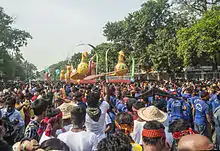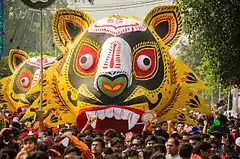Mangal Shobhajatra
Mangal Shobhajatra or Mangal Shovajatra (Bengali: মঙ্গল শোভাযাত্রা) is a mass procession that takes place at dawn on the first day of the Bengali New Year in Bangladesh.[1] The procession is organised by the teachers and students of the Faculty of Fine Arts of Dhaka University.[2] The festival is considered an expression of the secular identity of the Bangladeshi people and as a way to promote unity.[3] It was declared an intangible cultural heritage by UNESCO in 2016,[4] categorised on the representative list as a heritage of humanity.[5][6]
| Mangal Shobhajatra মঙ্গল শোভাযাত্রা | |
|---|---|
 Mangal Shobhajatra (2015) | |
| Status | Active |
| Genre | Procession |
| Date(s) | 14 April (First day of Bengali calendar) |
| Frequency | Annually |
| Location(s) | Dhaka University campus |
| Coordinates | 23.733242°N 90.3909218°E |
| Country | Bangladesh |
| Years active | 1989 – present |
| Organised by | University of Dhaka, Faculty of Fine Arts |
| Mangal Shobhajatra on Pahela Baishakh | |
|---|---|
| Country | Bangladesh |
| Domains | Social practices, rituals and festive events |
| Criteria | ??? |
| Reference | 01091 |
| Region | AP |
| Inscription history | |
| Inscription | 2016 (11th session) |
| List | Representative |
 | |
Etymology
The Bengali phrase Mangal Shobhajatra literally means "procession for well-being".[7]
History

The procession of the festival was first observed in 1989,[8] when the autocratic ruler Hussain Muhammad Ershad was the president of the country. He became the president of the country through a bloodless coup d'état.[9]
At that time, the country was under a military dictatorship and was suffering from floods. A mass uprising took place in Dhaka during which many people, including Noor Hossain, died.[10][11] The students of the Dhaka University Faculty of Fine Arts decided to demonstrate against the regime by arranging the Mangal Shobhajatra on Pahela Baishakh.[12][13][14]
About
Every year, thousands of people take part in the procession that features gigantic replicas of birds, fish, animals, folk tale and other motifs. The rally symbolizes unity, peace, and the driving away of evil to allow progress of country and humanity.[6][5] It is considered as an expression of the secular identity of the Bangali people, uniting the country irrespective of class, age, religious faith, or gender.[3]
UNESCO recognition
In 2014 the Bangla Academy compiled a nomination file that was approved by the Ministry of Cultural Affairs of Bangladesh and submitted to UNESCO.[12] On 30 November 2016 the Mangal Shobhajatra festival was selected as an intangible cultural heritage by the Inter-governmental Committee on Safeguarding Intangible Cultural Heritage of UNESCO at its 11th session, which was held in Addis Ababa, Ethiopia.[14][12]
Celebrations in India
In 2017, following the footsteps of Bangladesh, the festive Mangal Shobhajatra was brought out in West Bengal.[15][16]
References
- Habib, Haroon. "Dramatic dawn". The Hindu. Retrieved 30 November 2016.
- "'Mangal Shobhajatra' for removing evil". bdnews24.com. Retrieved 30 November 2016.
- "La bière belge inscrite au "patrimoine culturel immatériel" de l'humanité par l'Unesco". Le Huffington Post. Archived from the original on 30 November 2016. Retrieved 30 November 2016.
- "UNESCO recognises Mangal Shobhajatra as cultural heritage". UNESCO. 30 November 2016. Retrieved 30 November 2016.
- "UNESCO recognises Mangal Shobhajatra as cultural heritage". The Daily Star. 30 November 2016. Retrieved 30 November 2016.
- "UNESCO lists Mangal Shobhajatra as cultural heritage". Prothom Alo. Archived from the original on 1 December 2016. Retrieved 28 February 2017.
- "Mangal Shobhajatra included in Unesco cultural heritage list". The Nation. Retrieved 1 December 2016.
- "UNESCO Deems Belgium's Beer Culture A Treasure of Humanity". NPR. Retrieved 4 January 2017.
- "The Rocky Road of Democracy". The Daily Star. 6 December 2016. Retrieved 4 January 2017.
- "Dissent and the price of freedom". The Daily Star. 10 November 2016. Retrieved 22 January 2017.
- "Shaheed Noor Hossain Day observed". Prothom Alo. Archived from the original on 20 October 2017. Retrieved 22 January 2017.
- "Unesco lists Mangal Shobhajatra as cultural heritage". The Daily Star. Dhaka, Bangladesh. 1 December 2016. Retrieved 24 January 2017.
- "Pohela Boishakh's rally gets UNESCO's recognition". Prothom Alo. Archived from the original on 9 April 2017. Retrieved 1 December 2016.
- "Mangal Shobhajatra gets recognition as cultural heritage". Business News 24 BD. Retrieved 1 December 2016.
- এই প্রথম কলকাতার রাস্তায় ১ লা বৈশাখ হবে মঙ্গল শোভাযাত্রা (in Bengali). 9 April 2017.
- Eibela.Com. কলকাতায় প্রথমবারের মত মঙ্গল শোভাযাত্রা (in Bengali).
External links
| Wikimedia Commons has media related to Mangal Shobhajatra. |
- "Mangal Shobhajatra on Pahela Baishakh". UNESCO. 28 November 2016. Retrieved 30 November 2016.
